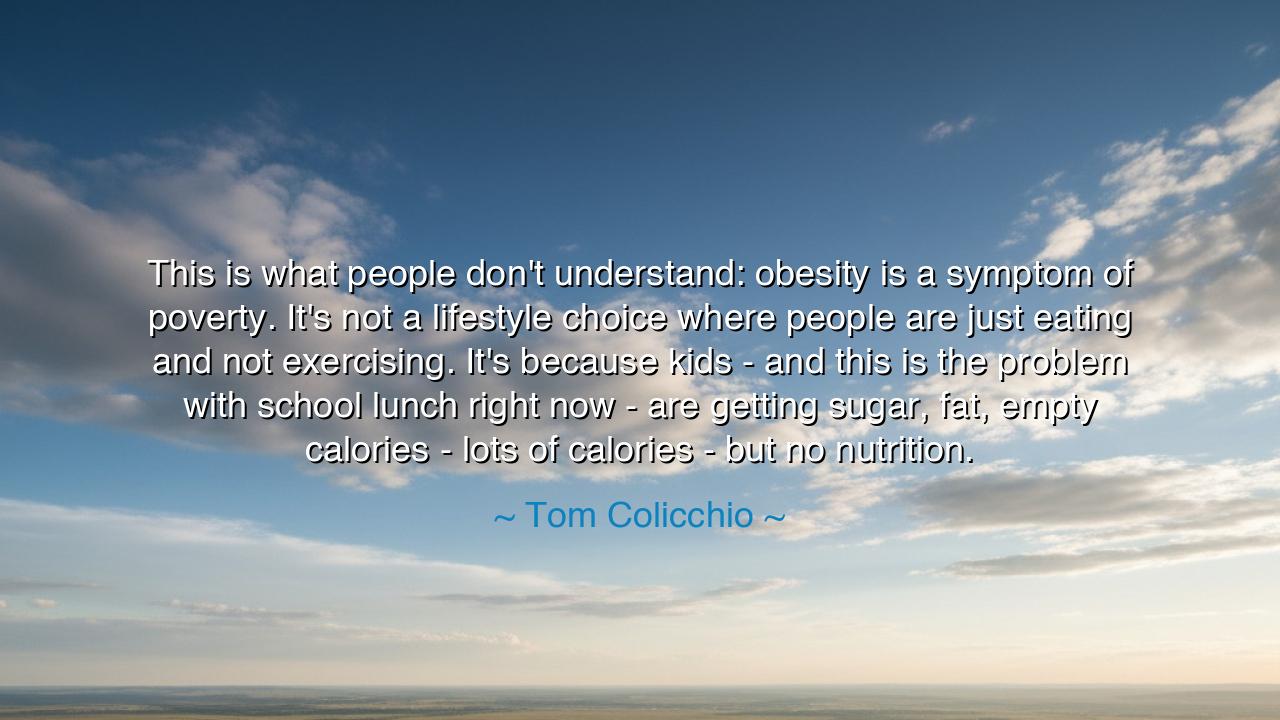
This is what people don't understand: obesity is a symptom of
This is what people don't understand: obesity is a symptom of poverty. It's not a lifestyle choice where people are just eating and not exercising. It's because kids - and this is the problem with school lunch right now - are getting sugar, fat, empty calories - lots of calories - but no nutrition.






In the journey of life, where we seek not only strength but wisdom, there are truths that pierce the soul and challenge our understanding of the world. Tom Colicchio’s words, “This is what people don't understand: obesity is a symptom of poverty. It's not a lifestyle choice where people are just eating and not exercising. It's because kids - and this is the problem with school lunch right now - are getting sugar, fat, empty calories - lots of calories - but no nutrition.”, strike at the very heart of a social injustice that has plagued societies throughout history. This statement is a profound call to examine the root causes of obesity, revealing that it is not merely a question of willpower or personal choices, but a reflection of deeper societal failures.
The ancient Greeks, in their pursuit of virtue and wisdom, understood that the health of the body was intricately tied to the environment and the conditions in which one lived. Hippocrates, the father of medicine, emphasized that food was the cornerstone of health. He believed that true healing came not from external treatments but from nourishing the body with the proper food—simple, whole, and full of life. However, the food available to many was often influenced by their means—and this disparity is not a modern issue but one rooted deeply in history. Hippocrates would have understood that if the poor had access only to cheap, empty calories—those that lack the nourishment needed for vitality—they would be impoverished not only in wealth but in health. Colicchio’s words echo this ancient truth: obesity is often a result of poverty, and the system that denies nutritious food to the most vulnerable is a system that perpetuates suffering.
In Rome, Cato the Elder believed that the right diet was essential for both the physical strength and mental clarity required to perform one’s duties. The Roman soldiers, who were seen as models of physical endurance, were carefully nourished with simple but sustaining food. However, the quality of food was often tied to one’s station in life, and the poor, even in Rome, struggled to access the nutrient-dense foods needed to remain strong and healthy. Cato would have been horrified by the idea of children being fed diets high in sugars and fats, for he understood that such foods would not only weaken their bodies but hinder their ability to contribute meaningfully to society. Colicchio’s lament about school lunches reflects this Roman understanding: the foods we feed our youth shape not only their health but their potential to thrive.
The Romans were not alone in recognizing the relationship between nutrition and human flourishing. Aristotle, in his teachings, argued that a well-balanced life required care for the body as well as the mind. He believed that true happiness and fulfillment came not from indulgence but from maintaining a balance—a balance that included a diet that nourished the body and allowed the mind to thrive. Colicchio’s point that sugar and fat offer only empty calories speaks to the failure of systems that deprive individuals, particularly children, of the essential nutrients they need to grow into healthy, capable individuals. Just as Aristotle warned against excess and imbalance, Colicchio calls us to recognize the imbalance in a system that makes poor food choices the default for the most vulnerable.
Consider the tale of Alexander the Great, who, despite his towering achievements, struggled with personal indulgence. Known for his military genius and discipline, Alexander often indulged in lavish feasts, consuming foods and drinks that were rich but lacked the nutritional value required to maintain his strength and clarity. His story serves as a reminder that even the most powerful can suffer the consequences of poor dietary choices, and when the foundations of health are undermined, the entire empire suffers. This paradox of indulgence and its consequences is one that Colicchio warns against—when we fail to provide for the most vulnerable, we set the stage for a collapse of collective strength.
The lesson in Colicchio’s words is both profound and urgent: obesity is not just an individual failing, but a symptom of larger systemic issues. It is a reflection of a society where the poor are deprived of access to nourishing food and where the most vulnerable suffer from food insecurity. The solution does not lie in blaming individuals for their choices, but in addressing the inequities that make healthy food inaccessible. The ancients understood that the true strength of a society lies in the well-being of its people, and that means providing nourishment that supports both body and mind.
As you move forward in your own life, reflect on the wisdom of the ancients and the call of Colicchio: our choices, as individuals and as a society, shape the future. To create a world where all children have access to nutritious food is to build a world where all people can thrive. Let us recognize the importance of nourishing the body with wholesome foods, just as we nourish the mind with knowledge and wisdom. For in doing so, we honor the legacy of those who came before us, who understood that true wealth lies not in abundance but in the health and strength of each individual, and in the care we take to provide for those who need it most.






AAdministratorAdministrator
Welcome, honored guests. Please leave a comment, we will respond soon